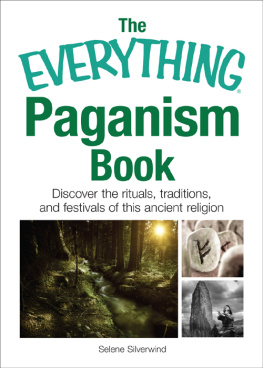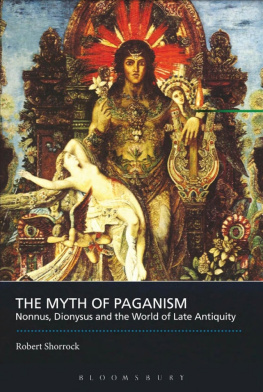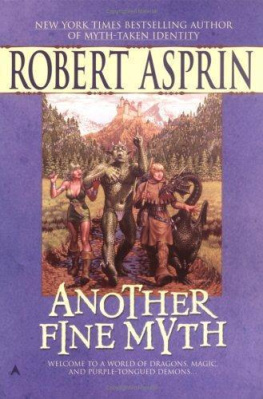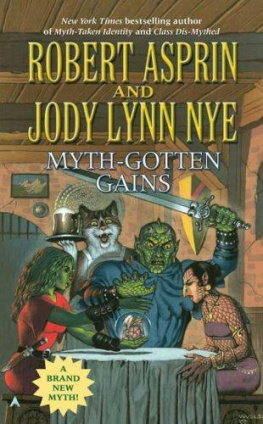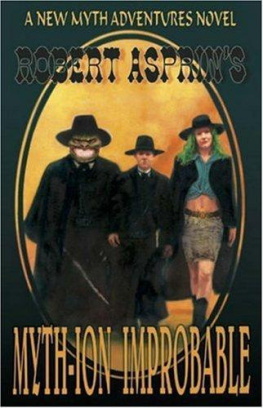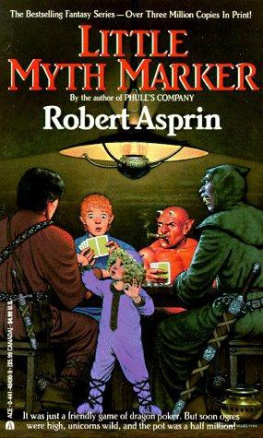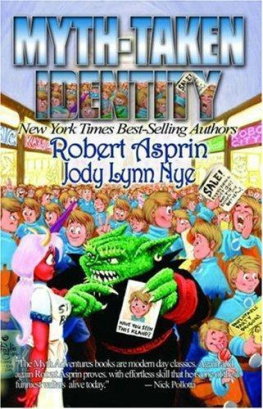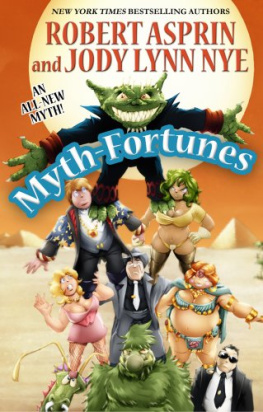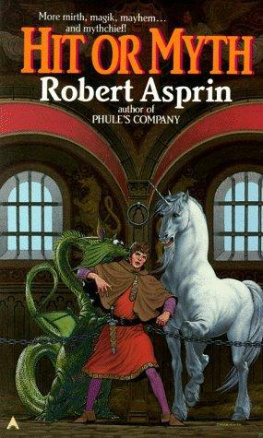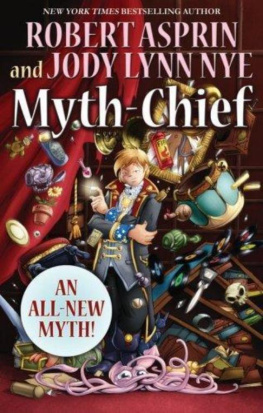Shorrock Robert - The Myth of Paganism
Here you can read online Shorrock Robert - The Myth of Paganism full text of the book (entire story) in english for free. Download pdf and epub, get meaning, cover and reviews about this ebook. year: 2011, publisher: Bloomsbury Publishing Plc, genre: Romance novel. Description of the work, (preface) as well as reviews are available. Best literature library LitArk.com created for fans of good reading and offers a wide selection of genres:
Romance novel
Science fiction
Adventure
Detective
Science
History
Home and family
Prose
Art
Politics
Computer
Non-fiction
Religion
Business
Children
Humor
Choose a favorite category and find really read worthwhile books. Enjoy immersion in the world of imagination, feel the emotions of the characters or learn something new for yourself, make an fascinating discovery.

- Book:The Myth of Paganism
- Author:
- Publisher:Bloomsbury Publishing Plc
- Genre:
- Year:2011
- Rating:5 / 5
- Favourites:Add to favourites
- Your mark:
- 100
- 1
- 2
- 3
- 4
- 5
The Myth of Paganism: summary, description and annotation
We offer to read an annotation, description, summary or preface (depends on what the author of the book "The Myth of Paganism" wrote himself). If you haven't found the necessary information about the book — write in the comments, we will try to find it.
The Myth of Paganism — read online for free the complete book (whole text) full work
Below is the text of the book, divided by pages. System saving the place of the last page read, allows you to conveniently read the book "The Myth of Paganism" online for free, without having to search again every time where you left off. Put a bookmark, and you can go to the page where you finished reading at any time.
Font size:
Interval:
Bookmark:
The Myth of Paganism
Classical Literature and Society
Series Editor: David Taylor
Classics and the Bible: Hospitality and Recognition
John Taylor
Culture and Philosophy in the Age of Plotinus
Mark Edwards
Homer: The Resonance of Epic
Barbara Graziosi & Johannes Haubold
Juvenal and the Satiric Genre
Frederick Jones
The Myth of Paganism: Nonnus, Dionysus and
the World of Late Antiquity
Robert Shorrock
Ovid and His Love Poetry
Rebecca Armstrong
Pastoral Inscriptions: Reading and
Writing Virgils Eclogues
Brian Breed
Pausanias: Travel Writing in Ancient Greece
Maria Pretzler
Propertius: Poet of Love and Leisure
Alison Keith
Silent Eloquence: Lucian and Pantomime Dancing
Ismene Lada-Richards
The Roman Book
Rex Winsbury
Thucydides and the Shaping of History
Emily Greenwood
CLASSICAL LITERATURE AND SOCIETY
Nonnus, Dionysus and the
World of Late Antiquity
Robert Shorrock

Bloomsbury Academic
An imprint of Bloomsbury Publishing Plc
50 Bedford Square | 1385 Broadway |
London | New York |
WC1B 3DP | NY 10018 |
UK | USA |
www.bloomsbury.com
First published in 2011 by Bristol Classical Press
Reprinted by Bloomsbury Academic 2013
Robert Shorrock 2011
Robert Shorrock has asserted his right under the Copyright, Designs
and Patents Act, 1988, to be identified as Authors of this work.
All rights reserved. No part of this publication may be reproduced or
transmitted in any form or by any means, electronic or mechanical,
including photocopying, recording, or any information storage or
retrieval system, without prior permission in writing
from the publishers.
No responsibility for loss caused to any individual or organization acting
on or refraining from action as a result of the material in this
publication can be accepted by Bloomsbury or the author.
British Library Cataloguing-in-Publication Data
A catalogue record for this book is available from the British Library.
eISBN-13: 978-1-4725-1966-5
Library of Congress Cataloging-in-Publication Data
A catalog record for this book is available from the Library of Congress.
The aim of this series is to consider Greek and Roman literature primarily in relation to genre and theme. Its authors hope to break new ground in doing so but with no intention of dismissing current interpretation where this is sound; they will be more concerned to engage closely with text, subtext and context. The series therefore adopts a homologous approach in looking at classical writers, one of whose major achievements was the fashioning of distinct modes of thought and utterance in poetry and prose. This led them to create a number of literary genres evolving their own particular forms, conventions and rules genres which live on today in contemporary culture.
Although studied within a literary tradition, these writers are also considered within their social and historical context, and the themes they explore are often both highly specific to that context and yet universal and everlasting. The ideas they conceive and formulate and the issues they debate find expression in a particular language, Latin or Greek, and belong to their particular era in the classical past. But they are also fully translatable into a form that is accessible as well as intelligible to those living in later centuries, in their own vernacular. Hence all quoted passages are rendered into clear, modern English.
These are books, then, which are equally for readers with or without knowledge of the Greek and Latin languages and with or without an acquaintance with the civilisation of the ancient world. They have plenty to offer the classical scholar, and are ideally suited to students reading for a degree in classical subjects. Yet they will interest too those studying European and contemporary literature, history and culture who wish to discover the roots and springs of our classical inheritance.
The series owes a special indebtedness and thanks to Pat Easterling, who from the start was a constant source of advice and encouragement. Others whose help has been invaluable are Robin Osborne who, if ever we were at a loss to think of an author for a particular topic, almost always came up with a suitable name or two and was never stinting of his time or opinion, and Tony Woodman, now at Virginia. The unfailing assistance of the late John W. Roberts, editor of the Oxford Dictionary of the Classical World, is also gratefully acknowledged. Deborah Blake, Duckworths indefatigable Editorial Director, has throughout offered full support, boundless enthusiasm and wise advice.
Finally, I pay tribute to the inspirational genius which Michael Gunningham, fons et origo of the series and an editor of consummate skill and phenomenal energy, brought to the enterprise. His imprint is everywhere: sine quo, non.
David Taylor
It has taken a long time for this project to see the light of day. I had high hopes of finishing this book before the birth of my first child. I now have three children and that first child is already seven years old. The Myth of Paganism has indeed been dragging on for so long that at times even I began to think that it was itself a myth. That I should have finished it at all is miraculous, but if anyone is to blame then Vedia Izzet must stand at the top of the list. To Deborah Blake I owe a great debt of gratitude for putting up with my regular prevarications and excuses with saintlike patience and never giving up on the book (and for her help with the cover). I would like to thank Michael Gunningham as the original commissioning editor for the series and the current series editor David Taylor for his helpful comments and support. A number of friends and colleagues have commented on various parts of the book, shared articles, ideas and bibliographies. I am particularly grateful to Gianfranco Agosti, Fotini Hadjittofi, Jason Knig, Konstantinos Spanoudakis and Mary Whitby, and to the participants of a stimulating conference on Later Greek Literature organised by Caterina Karvounis and Richard Hunter at the University of Cambridge back in 2006.
I would like to thank Eton College for the sabbatical leave that has at last given me the chance to put an end to The Myth of Paganism and to apologise in advance to my parents who think that the book they ordered on Amazon several years ago is going to be a good read.
31 May 2010
Cyprus
R.E.C.S.
Introduction: The Myth of Paganism
It may be admitted that the culture of the fifth century is not a fascinating study. The idolatry of mere literary form combined with the poverty of ideas, the enthusiastic worship of great models without a breath of the spirit which gave them their enduring charm, immense literary ambition without the power to create a single work of real artistic excellence this is not a subject which promises much interest.
Over the last 40 years or so our view of the critical landscape of late antiquity has been subject to a radical transformation. In the face of Edward Gibbons long-enduring notion of decline and fall, the work of scholars such as Peter Brown (on the body and society), Averil Cameron (on the formation of Christian discourse) and Jas Elsner (on material culture), has begun to revolutionise our understanding of this most complex of periods. Late antiquity has now begun to emerge as an arena of dynamic, self-confident and highly sophisticated interaction. In the area of literary culture, however, notions of decline and decay are still flourishing. Though of course we have come a long way from 1905 and the words of Samuel Dill quoted above, it was still possible to read as recently as 1998 that we are dealing with an epoch in which people did not express themselves chiefly through literature, which is therefore not outstanding. As this book will argue, nothing could be further from the truth: the literature of the period had a central role in helping to define and communicate what it meant to live in a post-Classical world.
Next pageFont size:
Interval:
Bookmark:
Similar books «The Myth of Paganism»
Look at similar books to The Myth of Paganism. We have selected literature similar in name and meaning in the hope of providing readers with more options to find new, interesting, not yet read works.
Discussion, reviews of the book The Myth of Paganism and just readers' own opinions. Leave your comments, write what you think about the work, its meaning or the main characters. Specify what exactly you liked and what you didn't like, and why you think so.

